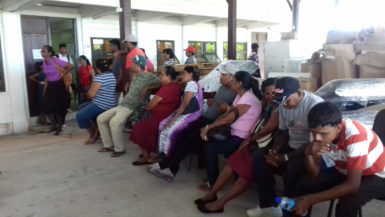The health service in Berbice is only administering yellow fever vaccines to pregnant women, newborn babies and persons who plan on travelling to Suriname, Trinidad, South America and South Africa, within seven to ten days.
Director of Health Services, Region Six Jevaughn Stephen told Stabroek News that this is owing to the recent outbreak in Angola and because these countries require a certificate showing that the traveller has received the yellow fever vaccination before allowing him/her in. The director emphasized that persons who plan on travelling to countries such as The Bahamas, Barbados and Jamaica need not rush for the vaccine, as the certificate is not a requirement.
“We need to let persons know that if they are going to North America there is no need for the vaccine,” Stephen said.

He said that while he is aware that persons still want to take precautions, “we are only administering the vaccines to persons who can show proof of immediate travel.”
One concerned citizen from Albion told this newspaper that he had visited the health centre in Williamsburg, Corentyne and was informed that the yellow fever vaccine was only being administered to pregnant women and children and he was referred to Georgetown. John Ramnarine, who plans to travel abroad in December, said it is stressful to have to travel all the way to Georgetown.
In response to this, Stephen stated that the region’s health centres are equipped to vaccinate new born babies and pregnant mothers. They are the target population for the health centres.

He said, “When we first started, we had persons who are travelling in December and wanted the vaccine. That defeated the whole purpose, as these vaccines are limited.”
Stephen admitted that since the outbreak, the rush for the vaccines has taken a toll on the Ministry of Public Health and the Regional Health Services, as well. He said, “I believe the region has done as much as they can to date with this vaccine.”
The region’s annual target for the yellow fever vaccine is 2,450. However, over the last five weeks, over 4,000 vaccines have been administered. He said, “That would have put our budgeted plan for the year somewhat in jeopardy and we are only seven months into the year. While we want to give a number of persons vaccines, we have to cater for our immediate target population, which is pregnant mothers and babies.”
He emphasized that at the Ministry of Public Health, after receiving the vaccine, a cost of $1,000 is paid to obtain the certificate. However, at the Region Six Regional Health Services, there is no cost attached to the certificate. “Because we do not have a separate accounting unit like the ministry, we are giving the certificate free because of transparency and accountability,” he said.
Stephen highlighted that if persons who would have received their vaccines sometime back needed a certificate to travel, they would have to take the paper given to them at the time they were vaccinated to have it stamped and the Regional Health Services would issue the certificate.




